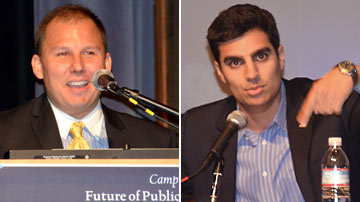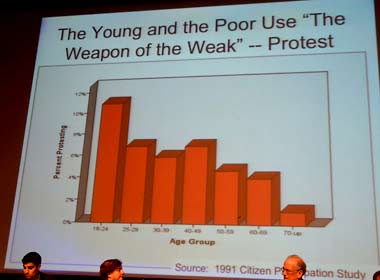Taxation, citizenship, protest and the future of UC
Three themes — taxation, citizenship and protest — were explored at the Dec. 6 Campus Forum on the Future of Public Universities, the second in a series of public conversations sponsored by campus deans. Many called for UC to form alliances with other institutions affected by public disinvestment.
December 7, 2011
“Our increasing disinvestment in public higher education is a tragedy,” declared Henry Brady, dean of the Goldman School of Public Policy, at Tuesday’s Forum on the Future of Public Higher Education. “Something,” he added, “has to be done.”
What that something might be was the question of the moment, as members of the campus community — in the second in a series of timely public conversations sponsored by campus deans — focused on themes of taxation, citizenship and protest as they bear on the University of California’s current crisis.
An effective student movement against rising fees and continued state disinvestment requires students willing to take up many roles, from protesting on campuses to lobbying in Sacramento, said panelist Jonathan Stein, UC student regent-designate and a law and public-policy grad student at Berkeley. “Without the students in tents, the students in suits cannot be effective, and vice versa,” he told an audience of more than 150 in Wheeler Auditorium.
But he prescribed “good old one-on-one retail politics” as well. “Go home over winter break, talk to every individual family member” about the importance of funding public education, Stein urged students. “I propose a statewide Christmas-break teach-in, with students doing the teaching.”

Alfredo Mireles and Jonathan Stein
“The near-term fate of this university” rests on November 2012 ballot measures that would help restore funding to public education, Stein added. UC student regent Alfredo Mireles likewise cited a few glimmers of hope on the funding front: Gov. Jerry Brown’s call for a temporary tax hike for the state’s highest earners, and a tax plan unveiled by the Think Long Committee for California.
Catherine Cole, professor of performance studies, asserted that a “30-year starvation diet imposed by Prop. 13… has put our great institution on life support.” But “let’s not let our financial troubles circumscribe our imaginations,” she urged. “The future of public universities in America must be invented.”
Cole invited others to join “Making UC Futures,” a cross-disciplinary working group at the Townsend Center for the Humanities conceived as an “incubation space” for re-imagining UC to meet the needs of our time — just as California’s Master Plan for Higher Education did in the last century, she noted.

Protest is how “the young and dispossessed” make their voices heard in politics, said Professor Henry Brady.
Brady, whose recent work focuses on public higher education, shared survey data showing how the rich and highly educated, while less inclined to prioritize public education, are more active in the political system that shapes public policy. The young and the poor, meanwhile, express themselves via protest, which he called “the weapon of the weak.”
“That’s what Occupy Wall Street is about, that’s what Occupy Cal is about,” Brady said. “I personally thank the Occupy Wall Street and Occupy Cal people for changing the conversation” to jobs and the need for public investment in “a whole lot of things, especially higher education.”
Concerns about police responses to last month’s student protests at Berkeley and UC Davis were raised both by those in the Wheeler Auditorium audience and panelists on stage. UC student regent Alfredo Mireles, a UCSF student and Cal grad, called for more state funding as well as “safer campuses, so students can freely express themselves.”

Catherine Cole, professor of performance studies
Speaking from the floor, Professor Barrie Thorne called the shadow of those events “an obstacle to mobilizing and getting back to addressing the main problem.” Cole, who has been studying South Africa’s Truth and Reconciliation process, suggested that UC tap its own resources — such as the Metta Center for Nonviolence started by professor emeritus Michael Nagler — to help the community repair itself and to ground administrators and others more deeply in the history of nonviolence.
Many recommended that UC form alliances with other, sometimes unlikely, allies. Panelist Donald Kennedy, past president of Stanford University, suggested that his colleagues on the Peninsula speak up on behalf of UC. And he challenged UC to join with other great public universities facing public disinvestment, such as Michigan, Wisconsin and Washington. “It’s important to build a national movement,” Kennedy said.
Others urged UC to make common cause with the California State University system and the state’s community colleges. If the three systems banded together to provide each student with an advocacy kit to share with their family, said Cole, “it would reach a very significant portion of the California population.”
More: What’s the future of public universities? Forum seeks way forward (NewsCenter article, Oct. 27, 2011)